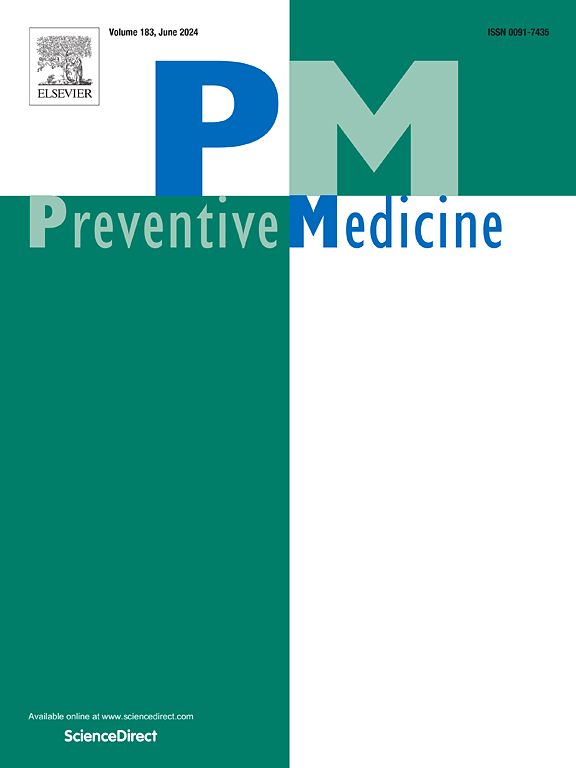后流行病时代邻里社会凝聚力对疫苗接种意愿的影响。
IF 4.3
2区 医学
Q1 MEDICINE, GENERAL & INTERNAL
引用次数: 0
摘要
目的研究COVID-19大流行后美国成年人感知的邻里社会凝聚力(NSC)与接种季节性流感疫苗和COVID-19疫苗意愿之间的关系:我们于 2023 年 5 月对美国居民(N = 2189)进行了一项具有全国代表性的横断面调查,调查内容包括他们感知到的邻里社会凝聚力、COVID-19 和季节性流感疫苗接种意向、医疗保健获取途径、感知到的 COVID-19 或流感感染风险、孤独感以及对医生的信任度。我们使用双变量 probit 回归法来检验感知到的 NSC 与接种流感疫苗和 COVID-19 疫苗的意愿之间的关联,同时控制了一些受访者特征(如种族)。与信任相关的 NSC(对邻居的信任)与接种流感疫苗和 COVID-19 疫苗的意愿呈正相关。较高的关系型 NSC(认为邻里关系紧密)与接种 COVID-19 疫苗的意愿呈正相关,而较高的价值型 NSC(认为邻里价值观相同)与接种 COVID-19 疫苗的意愿呈负相关。医疗服务的可及性、感知到的感染风险(COVID-19 或流感)以及对医生的信任与接种这两种病毒疫苗的意愿呈正相关:结论:在后大流行病时代,美国成年人中较高的信任相关性和关系相关性、感知到的NSC(疫苗依赖性)、较高的医疗保健可及性、较高的感知感染风险以及对医生的较高信任度与较高的流感和COVID-19疫苗接种意愿有关,而较高的基于价值的NSC与较低的COVID-19疫苗接种意愿有关。因此,NSC 的特定方面、获得医疗保健的障碍、关于感染风险的错误信息以及对医疗的不信任可能会影响个人接种疫苗的意愿和最终决定。本文章由计算机程序翻译,如有差异,请以英文原文为准。
Impact of perceived neighborhood social cohesion on vaccination intentions in the post-pandemic era
Objective
To examine the relationship between perceived neighborhood social cohesion (NSC) and intentions to obtain seasonal influenza and COVID-19 vaccines among US adults post COVID-19 pandemic.
Methods
We conducted a cross-sectional, nationally representative survey of US residents (N = 2189) in May 2023 on their perceived NSC, COVID-19 and seasonal influenza vaccination intentions, healthcare access, perceived risk of COVID-19 or flu infection, loneliness, and trust in doctors. We used bivariate probit regressions to examine joint associations between perceived NSC and intentions to receive influenza and COVID-19 vaccines, controlling for several participant characteristics (e.g., race).
Results
2164 respondents provided consent to study questions. Trust-related NSC (trust in neighbors) was positively associated with intentions to become vaccinated against both influenza and COVID-19 viruses. Higher relational NSC (perception of a close-knit neighborhood) was positively associated while higher value-based NSC (perception that neighbors share the same values) was negatively associated with intentions to become vaccinated against COVID-19. Healthcare access, perceived risk of infection (COVID-19 or flu), and trust in doctors were positively associated with intentions to become vaccinated against both viruses.
Conclusions
In a post-pandemic era, higher trust-related and relational, perceived NSC (vaccine-dependent), greater access to healthcare, higher perceived risk of infection, and greater trust in doctors were related to higher influenza and COVID-19 vaccination intentions, while higher value-based NSC was related to lower COVID-19 vaccination intentions among US adults. Thus, specific aspects of NSC, healthcare access barriers, misinformation on infection risk, and medical mistrust may influence an individual's willingness and ultimate decision to become vaccinated.
求助全文
通过发布文献求助,成功后即可免费获取论文全文。
去求助
来源期刊

Preventive medicine
医学-公共卫生、环境卫生与职业卫生
CiteScore
7.70
自引率
3.90%
发文量
0
审稿时长
42 days
期刊介绍:
Founded in 1972 by Ernst Wynder, Preventive Medicine is an international scholarly journal that provides prompt publication of original articles on the science and practice of disease prevention, health promotion, and public health policymaking. Preventive Medicine aims to reward innovation. It will favor insightful observational studies, thoughtful explorations of health data, unsuspected new angles for existing hypotheses, robust randomized controlled trials, and impartial systematic reviews. Preventive Medicine''s ultimate goal is to publish research that will have an impact on the work of practitioners of disease prevention and health promotion, as well as of related disciplines.
 求助内容:
求助内容: 应助结果提醒方式:
应助结果提醒方式:


